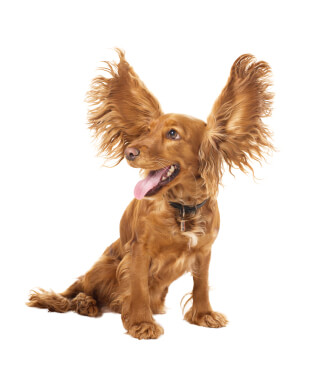- Home
- Cocker Spaniel Health Issues
- Symptoms of dog ear infections
Symptoms of Dog Ear Infections
We need to know how to spot the symptoms of dog ear infections so we can have it treated before it gets any worse. Ear infections in Cocker Spaniels can be painful. Don't we owe it to our pets to know what to look for?
Read on to learn how to tell if your dog has an ear infection, what can cause infections, and how best to treat it.
Symptoms of Dog Ear Infections
It's a well-known fact that Cocker Spaniels often suffer from ear problems, especially if their ears are not checked and cleaned regularly, but do you know what to look for?
 Know the symptoms of dog ear infections
Know the symptoms of dog ear infectionsWell, there are a few classic signs that may indicate a problem, and by checking your Cocker's ears often, you'll be able to deal with an ear infection sooner rather than later, long before it becomes a problem!
Common symptoms of dog ear infections can appear as follows:
- the inside of your pet's ears look inflamed or swollen;
- your Cocker's ears are tender or sensitive to touch;
- there's a strong, foul-smelling odour coming from one or both of his ears;
- you notice a dark, strong-smelling, waxy discharge;
- more than the usual amount of ear wax;
- your dog shakes his head as though he's trying to shake something out;
- he starts to tilt his head to one side, as though he's listening to something;
- he rubs his head or his ears along the floor;
- your Cocker scratches his lugs more often than he usually does;
- you notice hair loss around the entrance to the ear canal.
More Symptoms of Dog Ear Infections
- blood blisters or blood inside the ear;
- melanomas (tumours);
- your Cocker appears not to hear you;
- he seems to lose his balance occasionally;
- a change in your dog's behaviour, for example, depression, irritability or lethargy.
If you think your pet may have one or more of the above symptoms of dog ear infections, it's probably a good idea to take him to see his vet, who'll be able to confirm your suspicions.
It's best not to clean his ears before you see the vet. If you do, you'll be removing any visible evidence of infection, which will only make it more difficult for your vet to make a speedy and accurate diagnosis.
I certainly don't recommend that you try to diagnose or treat the problem yourself.
Ear infections in dogs can be tricky to diagnose accurately, never mind treat, and if you don't get it right, you may just be making matters worse.
What Causes Cocker Spaniel Ear Infections?
There are many things that can cause ear problems in our dogs, but one of the main causes is an increase in yeast or bacterial growth, and believe me, your dog doesn't want a yeast infection in his ears.
 Ear infection in Cocker Spaniels can be painful!
Ear infection in Cocker Spaniels can be painful!There are also many illnesses and diseases that can cause infection too, but one of the main culprits is water.
If your Cocker's ears hold water after swimming or being groomed, bacteria will multiply (because bacteria love dark, warm, moist places) and that's when the problems begin!
It's a good idea to clean your Cocker's ears with a gentle ear-cleaning solution and then dry them thoroughly each time he's been in contact with water.
Allergies are another common cause of ear problems in dogs.
Your pet may be allergic to pollen, grasses or even a certain food, all of which can manifest as ear problems.
Parasitic diseases, such as ear mites, fleas and ticks can also cause ear infections in dogs, (as well as allergies) so it's important to treat your cocker for parasites regularly.
A foreign body, such as a grass seed, can also cause an ear infection.
Max has had many grass seeds removed from his ear. The vet removed three seeds from the same ear only last month! Yet more expense. Oh the joys of being owned by a Cocker Spaniel!
Preventing Ear Infections In Dogs
Most of the above ear infections can be avoided by keeping your dog's ears clean and dry to prevent bacteria from growing in the first place, unless of course the infection is simply a symptom of an underlying illness, in which case the illness will also need to be treated.
That's
why it's especially important not to try and diagnose or treat your pet's ear infection yourself.
Prevention is often better than the cure and cleaning your dog's ears regularly will help you to keep bacteria at bay, allowing your dog a better chance of avoiding infections altogether.
Regular checks will also alert you to any potential problems sooner rather than later, which means your vet can diagnose and treat earlier before it becomes a serious problem.
More About Cocker Spaniel Ears
Cocker Spaniel ears need extra care so it's important to understand how to look after them properly and what 'general maintenance' tips we can follow to keep infection at bay.
Click on the lovely Cocker Spaniel photo to learn more.
Photo Credit: Symptoms of Dog Ear Infections
1. Zaretskaya at https://www.istockphoto.com/stock-photo/21131414/adorable-cocker-spaniel-with-flying-ears-in-studio.php?st=59eaf64
2. Elena Stepanova at Foltolia.com (https://stock.adobe.com/fr/21895488)



